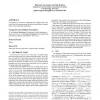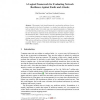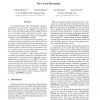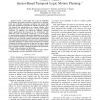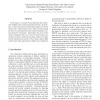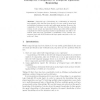ATAL
2007
Springer
14 years 11 months ago
2007
Springer
We propose an extension of alternating-time temporal logic, that can be used for reasoning about the behavior and abilities of agents under various rationality assumptions. Catego...
ASIAN
2007
Springer
14 years 11 months ago
2007
Springer
Abstract. We present a logic-based framework to evaluate the resilience of computer networks in the face of incidents, i.e., attacks from malicious intruders as well as random faul...
QEST
2007
IEEE
14 years 11 months ago
2007
IEEE
Stochastic game logic (SGL) is a new temporal logic that combines features of alternating temporal logic (to formalize the individual views and cooperation and reaction facilities...
LICS
2007
IEEE
14 years 11 months ago
2007
IEEE
In an influential paper titled “The Benefits of Relaxing Punctuality” [2], Alur, Feder, and Henzinger introduced Metric Interval Temporal Logic (MITL) as a fragment of the r...
ICRA
2007
IEEE
14 years 11 months ago
2007
IEEE
— Given a robot model and a class of admissible environments, this paper provides a framework for automatically and verifiably composing controllers that satisfy high level task...
TIME
2008
IEEE
14 years 11 months ago
2008
IEEE
In this paper we consider the specification and verification of infinite-state systems using temporal logic. In particular, we describe parameterised systems using a new variet...
LFCS
2009
Springer
14 years 11 months ago
2009
Springer
In this paper we study several properties of the Exogenous Probabilistic Propositional Logic (EPPL), a logic for reasoning about probabilities, with the purpose of introducing a t...
FSTTCS
2009
Springer
14 years 11 months ago
2009
Springer
Linear temporal logic was introduced in order to reason about reactive systems. It is often considered with respect to infinite words, to specify the behaviour of long-running sys...
FROCOS
2009
Springer
14 years 11 months ago
2009
Springer
Temporal logic of knowledge is a combination of temporal and epistemic logic that has been shown to be very useful in areas such as distributed systems, security, and multi-agent s...
FORMATS
2009
Springer
14 years 11 months ago
2009
Springer
Abstract. We study the realizability problem for specifications of reactive systems expressed in real-time linear temporal logics. The logics we consider are subsets of MITL (Metr...
